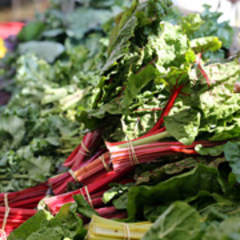BY PAT TERRY July 24, 2012 3:26PM

Green Acres Farm in North Judson, Indiana sells red chard among other produce. Shoppers visit the outdoor Green City Market in Chicago’s Lincoln Park on Saturday, July 14, 2012. | Richard A. Chapman~Sun-Times
Until this market season, “green” was in the eye of the beholder at Chicago’s Green City Market. Farmers often tossed out terms like “organic,” “virtually organic,” “all-natural” and “sustainable” without any real definitions.
But 2012 is different: All farmers at the 2012 Green City Market (GCM) are required to have one of eight independent, third-party certifications, ranging from USDA Organic, Naturally Grown and the Food Alliance to Animal Welfare Approved. These certifications provide information about a farmer’s practices: use of chemical or organic sprays, antibiotics and hormones, genetically modified crops or feed, grassland pastures and/or treatment of animals.
Raising the “green” bar makes this Chicago market unique. “To my knowledge, Green City Market is the only farmers market in the country to require independent, third-party certification,” says executive director Dana Benigno.
Stacy Miller, executive director of the Farmers Market Coalition, Washington, D.C., concurs, adding, “I think other farmers markets with a mission of sustainability will look to this as a model.”
Nearly half of GCM farmers opted for USDA Organic certification (20, plus one pending), but this “gold standard” is too expensive and too much paperwork for many small farmers. It also means setting aside an unplanted “buffer zone” to protect organic crops from chemicals used on neighboring farms.
Two other popular produce certifications are Certified Naturally Grown (nine farmers) and the Food Alliance (eight), while three fruit growers picked the Michigan Agriculture Environmental Assurance Program/MAEAP. Many dairy and animal farmers chose Animal Welfare Approved (three), American Humane Certified (two) and Certified Humane® (one).
“We lost one or two vendors because of certification,” laments David Cleverdon of Kinnikinnick Farm in Caledonia, organic since 1996. “They’re very good farmers, but they just had too much invested in their current setup.”
To Continue Reading the Article Click the Link Below:
www.suntimes.com

Suntimes.com
Posted: July 24, 2012 by Certified Humane
BY PAT TERRY July 24, 2012 3:26PM
Green Acres Farm in North Judson, Indiana sells red chard among other produce. Shoppers visit the outdoor Green City Market in Chicago’s Lincoln Park on Saturday, July 14, 2012. | Richard A. Chapman~Sun-Times
Until this market season, “green” was in the eye of the beholder at Chicago’s Green City Market. Farmers often tossed out terms like “organic,” “virtually organic,” “all-natural” and “sustainable” without any real definitions.
But 2012 is different: All farmers at the 2012 Green City Market (GCM) are required to have one of eight independent, third-party certifications, ranging from USDA Organic, Naturally Grown and the Food Alliance to Animal Welfare Approved. These certifications provide information about a farmer’s practices: use of chemical or organic sprays, antibiotics and hormones, genetically modified crops or feed, grassland pastures and/or treatment of animals.
Raising the “green” bar makes this Chicago market unique. “To my knowledge, Green City Market is the only farmers market in the country to require independent, third-party certification,” says executive director Dana Benigno.
Stacy Miller, executive director of the Farmers Market Coalition, Washington, D.C., concurs, adding, “I think other farmers markets with a mission of sustainability will look to this as a model.”
Nearly half of GCM farmers opted for USDA Organic certification (20, plus one pending), but this “gold standard” is too expensive and too much paperwork for many small farmers. It also means setting aside an unplanted “buffer zone” to protect organic crops from chemicals used on neighboring farms.
Two other popular produce certifications are Certified Naturally Grown (nine farmers) and the Food Alliance (eight), while three fruit growers picked the Michigan Agriculture Environmental Assurance Program/MAEAP. Many dairy and animal farmers chose Animal Welfare Approved (three), American Humane Certified (two) and Certified Humane® (one).
“We lost one or two vendors because of certification,” laments David Cleverdon of Kinnikinnick Farm in Caledonia, organic since 1996. “They’re very good farmers, but they just had too much invested in their current setup.”
To Continue Reading the Article Click the Link Below:
www.suntimes.com
Category: news